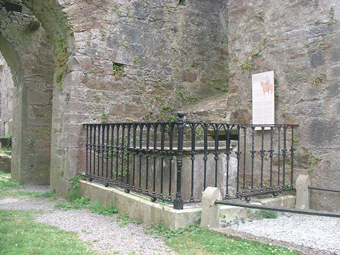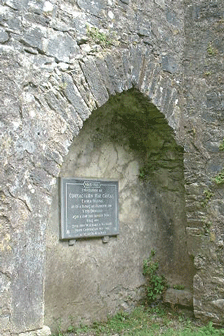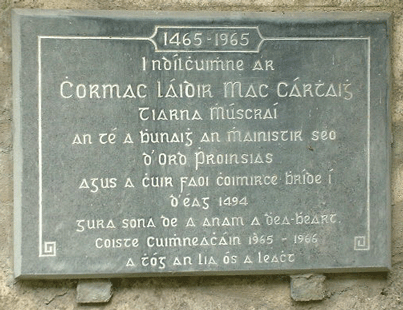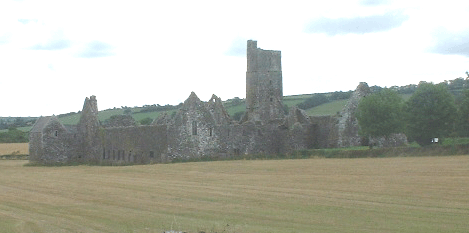
Cormac Láidir Mac Cárthaigh, Tiarna Mhúscraí, a bhunaigh an mhainistir seo do Bheachtchoimeádaithe Riail Naomh Phroinsiais i 1465.
Kilcrea Friary was founded for the Franciscan Observants in 1465 by Cormac Láidir Mac Carthaigh, Lord of Muskerry.
The name Kilcrea means the Church of Cré, a woman who founded a hermitage here before the time of the Franciscians. The friary is a fine example of an Irish Franciscian monastery and most of it survives in good condition. The church features a fine, slender tower which was used as a belfry. Within the building are the burial places of Art Ó Laoire and Cormac Láidir McCarthy.
Scriptorium
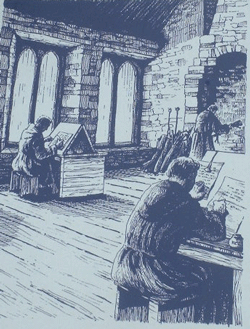
Scriptorium – An artist’s impression 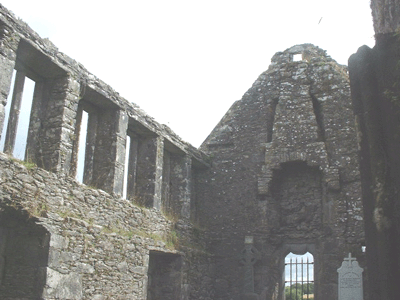
As it is today
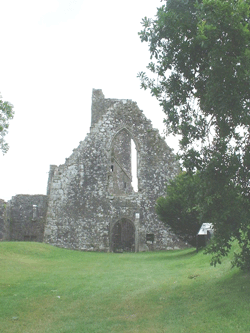
Kilcrea Abbey Entrance 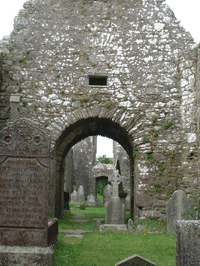
Foot of Belfry Tower 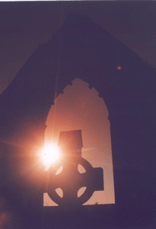
Window at sunset
Art O’Leary
Arthur O’Leary was born at Raleigh near Macroom in 1747. He was a member of a prosperous Catholic family, which, despite the Penal Laws, managed to retain extensive land holdings between Macroom and Gougane Barra. Denied educational and career opportunities at home because of the Penal Laws, Arthur, like many Catholic young men of good family, went abroad where he served as a captain in the Hungarian Huzzars.
Arthur married Eibhlín Dubh Ní Chonaill, aunt of the Liberator Daniel O’Connell, in 1767 on his return from service abroad. He was killed in 1773 at Carriganima near Macroom by soldiers accompanying a local magistrate, Abraham Morris (also known as Morrison) of Hanover Hall, allegedly for refusing to sell his horse to Morris for £5, a legal technicality designed to prevent Catholics owning horses fit for Military Service.
In fact, his death was the culmination of a bitter and personal feud between the two men, caused by Art’s assertive behaviour and Morris’s determination to keep the Penal Laws alive. Morris had to stand trial for murder but was acquitted.
A celebrated lament in Irish, attributed to Eibhlín Dubh, Caoineadh Art Uí Laoghaire, is an emotionally powerful description of her reaction to his death. The tragic appeal of the poem has earned it a lasting place in Irish Literature and ensured that Arthur O’Leary will not be forgotten.
The following passage of the lament appears to have been sung by Eibhlín at Art’s burial:
| My love and my beloved Your corn-stacks are standing your yellow cows milking. Your grief upon my heart all of Munster couldn’t cure, nor the smiths of Oileáin na bhFionn, Till Art Ó Laoghaire comes my grief will not disperse but cram my heart’s core, shut firmly in like a trunk locked up when the key is lost. | Mo ghrá thú agus mo rún! Tá do stácaí ar a mbonn, Tá do bha buí á gcrú; Is ar mo chroí atá do chumha Ná leigheasfadh Cúige Mumhan Ná Gaibhne Oileán na bhFionn. Go dtiocfaidh Art Ó Laoghaire chugham Ní scaipfidh ar mo chumha Atá i lár mo chroí á bhrú; Dúnta suas go dlúth Mar a bheadh glas a bheadh ar thrúnc ‘S go raghadh an eochair amú. |
